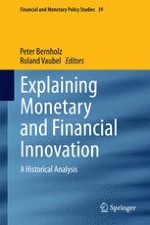
2014 | OriginalPaper | Chapter
The Political Economy of Monetary and Financial Innovation: Introduction and Overview
Authors : Peter Bernholz, Roland Vaubel
Published in: Explaining Monetary and Financial Innovation
Publisher: Springer International Publishing
Activate our intelligent search to find suitable subject content or patents.
Select sections of text to find matching patents with Artificial Intelligence. powered by
Select sections of text to find additional relevant content using AI-assisted search. powered by
Excerpt
…Nothing is more favourable to the rise of politeness and learning, than a number of neighbouring and independent states, connected together by commerce and policy. The emulation, which naturally arises among those neighbouring states, is an obvious source of improvement (Hume 1742: 119).